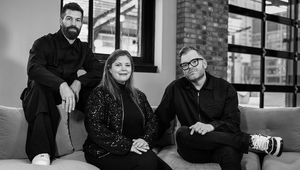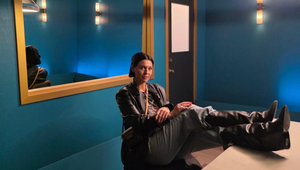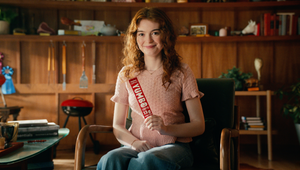
Production Line: Catherine Hudon

Catherine Hudon is an award-winning executive integrated producer and brand architect/strategist at Havas Chicago. Her experience spans over 15 years of marketing leadership in strategy, production, cause marketing, publishing, fashion, motor sports, MLB, spirits, music, tech, design and pharma. Catherine has produced television, films, commercials, VR, radio, mobile apps, games, software, 3D animation, interactive movie trailers, experiential stunts, experiential events, music and large-scale VFX.
LBB> What lasting impact has the experience of the pandemic had on how you and your agency think about and approach production?
Catherine> “Human beings can get used to virtually anything”.
This quote that I read somewhere reminds me of how we have had to fundamentally change our approach to production at the onset of the pandemic. Once we got over the initial shock of the reality, we as an organisation had to figure out and implement solutions, then educate our clients on how we could keep things moving while avoiding getting COVID or infecting others by complying with regulations. New workflows, working from home, and new security and safety protocols were put in place to meet the challenges of the COVID-19 era. It really forced us in the production world to become even more nimble and adaptive.
One upshot from my POV is that this has been a time where I have seen the production industries come (virtually of course) together to feed each other information since no one had ever experienced this before. It has been very much continuous conversations with agency producers, reps, line producers from film and TV, and production companies stateside and internationally. Rules were changing on a daily basis as we were still figuring out details. The only way to stay on top of it all was to talk to others in other cities, states and countries on zooms, forums, emails and WhatsApp chats. I believe that as a result there is a greater sense of community within production.
LBB> A good producer should be able to produce for any medium, from film to events to digital. Do you agree or disagree with this statement? Why/why not?
Catherine> I think a great producer is able to organise genius and make ideas come into being, from start to finish, across all platforms, for every kind of endeavor. Most of the great producers I know are straddling both hemispheres of their brain. We are oftentimes pragmatic but also creative thinkers. This contributes to being able to adapt and evolve new processes and incorporate new approaches.
The creative sparks the energy and passion it takes to produce amazing work, and this is what I love! It’s as close to a superpower as anything.
LBB> What’s your own pathway to production? When you started out, what sort of work were you producing and what lessons have stayed with you in that time?
Catherine> I started out as a classical piano performance major and developed tendinitis my junior year of college. I had to come to terms with the very sobering fact that I was not going to be a concert artist. At that time a really good friend saw me floundering in some major denial and administered some tough love. Looking back I realise that being a classical musician has been the perfect foundation for me evolving into a producer. As a producer I take creative and bring it to life. It was the same as a classical musician — I would take pieces and infuse my own interpretation into the work.
All I did know at the time was that I didn’t want to leave music, so I decided to double major in music business and started managing some bands. From there I met the publisher of the largest college monthly (at the time) and started writing music reviews. The next two years consisted of going to hundreds of shows and writing. And then I became the music editor with 34 contributing writers under me. The publisher of the magazine became a mentor. He was the first really big thinker I had ever met, and he taught me a ton about connecting dots, achieving the impossible, marketing and producing (before I even knew what a producer was). At the time he was using the magazine as a platform to promote bands and sponsors on the college circuit to fund tours and mini festivals for then-emerging bands like The Gin Blossoms, Better Than Ezra and The Lemonheads.
My next career leap was into indie film production, which is when I realised my calling. Since then I have produced for TV, a feature film and documentaries, and loads of digital production for apps, websites and software, AR, VR, experiential stunts and launches for clothing brands. I was the director of marketing for a IndyCar Nascar team, a business architect and consultant for a design company called The Paris Apartment, and I launched a women’s clothing company. As you can perhaps deduce, I tend to follow my passions when it comes to my career.
LBB> When working with a new partner or collaborator, how do you go about establishing trust?
Catherine> I think the best way to establish trust in our current situation is to start by making a simple human connection, whether it’s a zoom or a phone call. I think it’s important to see someone’s face or hear their voice to make sure that we are in lockstep from the beginning. Production doesn't work without teamwork and great collaborators, so my relationships mean everything. I try to set the tone by making sure they know I will provide them with everything in my power to succeed and knock it out of the park, as well being clear what the expectations are.
One last and important part if appropriate is letting them know that they are a part of a group striving to be great. That’s a basic human need, isn’t it?
LBB> Clients’ thirst for content seems to be unquenchable - and they need content that’s fast and responsive! What’s the key to creating LOTS of stuff at SPEED - without sacrificing production values? Is it even possible?
Catherine> This is the world we live in — clients/humans are always going to want more. I think now more than ever it’s our job as experts in our respective fields to educate on what is possible and realistic for the circumstances, budget and timing. My teams know that I'll work closely with them to address their needs and solve the client objectives. I think a lot of challenges are solved when we take the time to learn and understand what the objectives are and what is driving requests. If quality is going to suffer because there’s not enough time or money, then it’s our job to let clients know that this and provide an alternative plan that will produce better results. At this point you have presented your best solutions to the client, and hopefully you have established trust, but at the end of the day they will decide.
LBB> To what extent is production strategic - traditionally it’s the part that comes at the ‘end’ of the agency process, but it seems in many cases production is a valuable voice to have right up top - what are your thoughts/experiences of this?
Catherine> Production is very strategic, and I think that it shouldn’t be thought of as a deliverable tactic but as delivery of strategy. There are so many ways to skin the cat so it’s important to understand the objectives of our brand clients and how brands are interacting with people on platforms and how people are interacting with the brands. As producers we should be informing and working closely with strategy and creative teams to integrate production, strategy and creative from the get-go. This helps brand consistency, can create process efficiencies and can also help in overall production savings. Production should not be seen as supplementary at the end of the process, but instead should be treated as the visualization of the cumulative strategic process. Integrating production with strategy from the outset is an everyday luxury we have at Havas with the Village model.
LBB> What’s the most exciting thing about working in production right now?
Catherine> For me the most exciting thing working in production now is the global world creative spirit coupled with advances in technology. I have the luxury to work with world-class artists, technologists and makers, both seasoned and young. VR technology is becoming more immersive and has the potential to change our lives — we haven’t even scratched the surface!
LBB> And what advice would you give to an aspiring agency producer?
Catherine> • Be open and curious
• Find your passions
• Find a mentor
• Work your ass off and set yourself apart












